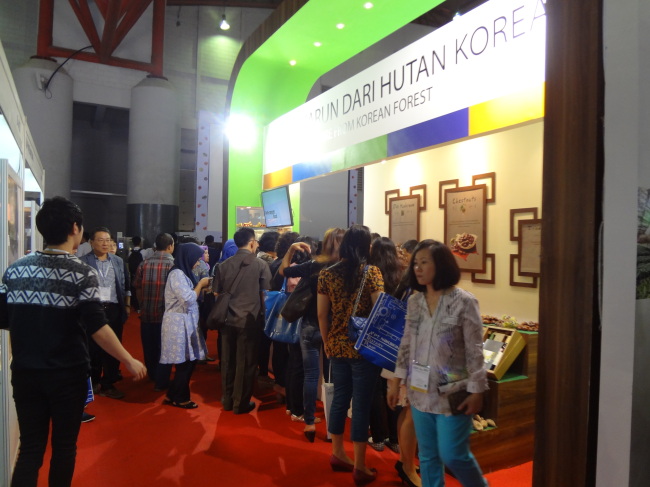The Korea Forest Service is seeking to expand the nation’s export of premium-quality forest products to China, catching on the growing demand for food safety in the world’s No. 2 economy.
The KFS on Monday said it is in the last stage of meeting this year’s export goal of $500 million for forest products, thanks to the stable construction of export-intensive frameworks, including the Korea-China free trade agreement, international e-commerce and marketing, and larger allocation of government budget.
This year, the sector was assigned a budget of 5.73 billion won ($4.88 million), up 9.7 percent from a year ago. The allocation is reflective of President Park Geun-hye administration’s emphasis on the export of value-added products.
“For export to China, we have prepared a variety of star forest products that excel in quality and competitiveness,” a KFS official said.
The KFS has pinned high hopes on the outbound sales of healthy food. Some of the top-notch products include mountain-cultivated ginseng, chestnuts, persimmons, shiitake mushrooms and plywood products. The KFS has been fostering an export cooperative for these items -- a joint platform of scale and shared know-hows. The members of this cooperative are granted incentives in logistics and insurance costs, according to the KFS.
The agency has provided intensive financial support for one promising forest crop every year. This year, the persimmon orchards in Cheongdo, North Gyeongsang Province, benefited from the state project. Of the 2-billion-won project, the Korean government funded 1 billion won, the local government 400 million won and farmers 600 million won.
The star-crop fostering plan supported chestnut farms in Cheongyang, South Chungcheong Province, in 2014 and shiitake mushroom farms in Buyeo, South Chungcheong Province, in 2013.
The KFS has set up key facilities and instruments for common use at major production sites of forest products.
In addition to product development, the KFS has put strong emphasis on the research and development of packaging technology, which helps perishable products stay fresh longer. From 2014 to 2016, Korea Food Research Institute set aside 600 million won budget to develop mid- and long-term packing and distribution technologies.
To boost sales of forest products to China, the KFS emphasizes three factors -- cut-throat market research; selection of promising export items; resolution of export barriers and joint efforts between the state and the enterprises.
The KFS is spurring promotion and high-end marketing in mainland China, Taiwan and Hong Kong.
By regions, the KFS is targeting the high-end demand in China, to make full advantage of the Korea-China free trade agreement. The KFS has supported a number of market tests, global food conventions and Korean food fairs. It has also invested 55 million won in expanding antenna shops and pop-up stores in Chinese distribution giants.
The KFS expects Qingdao logistics center of Korea Agro-Fisheries and Food Trade Corp, or aT, located in the Chinese province of Shandong, to serve as the distribution base for Korea’s export of forest products to the communist nation.
Online shopping sites, including Chinese e-commerce giant Alibaba, and television home shopping promotions will also play a key role in presenting popular safe food to Chinese households, the KFS said.
In Hong Kong and Taiwan, the Korean forest authorities are eyeing the high-end natural ingredient markets, where the dine-out culture is dominant. Premium mushroom products and farmed mountain ginseng topped the KFS’s list of promotions at K-Food Fair, hosted by Korean Agriculture Ministry and other big-name K-culture conventions.
The KFS continues to support Korean suppliers to participate in international food conventions. This year, it has set aside 250 million won to sort out and support promising prospective exporters.
In addition to China, KFS also vowed stronger support for Korean exports to Japan, North America, Europe, Southeast Asia and the Middle East.
Despite the current unfavorable export environment due to the weak yen, the KFS expects Korean forest products to be competitive in Japanese groceries market -- particularly due to Japanese customers’ increasing calls for safe food and more vegetables in the daily diet.
The KFS also supports “Buy Korea Food” and other promotional conventions and export consulting fairs, stressing the need for constant communication and discussion among Korean exporters and Japanese buyers.
In the United States and Canada, the KFS seeks to expand supply to the retail giants, such as Wal-Mart and ethnic food markets. Food safety and environment-friendliness are key to increasing presence in this region, according to the KFS.
Europe is only beginning to explore Korean forest products, and it is a market that requires Korea’s active advertisement and promotion.
This year, the Korean government has increased emphasis on the halal food markets in Malaysia, Indonesia and the Middle Eastern economies, particularly in the wake of President Park’s visit to the Middle East in March.
The KFS stressed that Korean exporters to the halal market must accumulate expertise and infrastructure to meet the strict processing regulations in the highly-religious market.
By Chung Joo-won (
joowonc@heraldcorp.com)





![[Exclusive] Hyundai Mobis eyes closer ties with BYD](http://res.heraldm.com/phpwas/restmb_idxmake.php?idx=644&simg=/content/image/2024/11/25/20241125050044_0.jpg)
![[Herald Review] 'Gangnam B-Side' combines social realism with masterful suspense, performance](http://res.heraldm.com/phpwas/restmb_idxmake.php?idx=644&simg=/content/image/2024/11/25/20241125050072_0.jpg)

